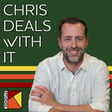Become a Creator today!Start creating today - Share your story with the world!
Start for free
00:00:00
00:00:01

EP 78 - A Creative Process: Part 4 - Editing
This is part 4 of a multi-part series about the creative process. We’ll cover my thoughts on how this process applies to creating & publishing works, and how it applies to games, fiction writing, other creative endeavors, and our professional careers.
For more info & to download a free PDF of today's episode notes, visit: www.chriskreuter.com/CDWI
Join the Kreuter Studios mailing list: https://mailchi.mp/810367311f3d/ksbulletin
Recommended
Transcript
Introduction to Chris Kreuter and 'Chris Deals With It'
00:00:08
Speaker
On Chris deals with it, I talk about the frameworks and methods I use to clear personal, creative, and professional roadblocks. My goal is to help others bridge the gaps between where they're at now and what they want to achieve.
Chris's Diverse Background and Creative Application
00:00:20
Speaker
If you're new to the show, I'm an engineer, writer, parent, game designer, leader, and reader who leverages that experience to develop creative solutions to problems.
Episode 78: Creative Process Without AI Tools
00:00:30
Speaker
First, an AI statement, that all elements of this episode are products of the author, Chris Kreuter, and made without the use of any AI tools.
00:00:39
Speaker
Welcome to episode 78 of Chris Deals With It.
Focus on Editing in Creative Processes
00:00:42
Speaker
This is part four of a multi-part series about the creative process. We'll cover my thoughts on editing and how this process applies to creating and publishing works, and how it applies to games, fiction writing, other creative endeavors, and our professional careers.
00:00:57
Speaker
As always, the views expressed in this podcast are mine. What works for me isn't likely to work for you in exactly the same way. The usefulness of these various pieces of advice will depend on your project, experience, tools, and more that I'll get into.
00:01:11
Speaker
The goal of this series is to share my frameworks, mindsets, strategies, and experiences that have led me to this point of my creative journey. This is an ever-evolving process as it should be for everyone.
00:01:23
Speaker
So editing, we're going to talk about why and how we should refine our work, the critical service that editing performs for your audience, getting and receiving feedback, and the importance of testing groups.
00:01:35
Speaker
Editing is an act of creation. It's a critical service that you give your audience. You are going to put in the work to make your project as impactful as possible for them. You are respecting their time and attention by putting in those extra layers of effort.
Considering Audience Agency in Creation
00:01:49
Speaker
In your project, you want to evaluate how much agency does your player, reader, listener, watcher have? Are you leading them by the nose? Do you have to because of the format of the work?
00:02:00
Speaker
How much can they integrate their personal experiences into the work? An example here might be if you're designing a role-playing game, there'd be a very different evaluation of agency versus making a YouTube video.
Balancing Quality and Quantity in Creative Work
00:02:12
Speaker
You also want to decide, are you going for quantity over quality? Now this scale is going to be different for everyone. Are you someone that just wants to say that you wrote made something or get a certain number of things out the door? Or are you trying to make something great?
00:02:26
Speaker
To do that, you have to be honest with your work's flaws. Are you identifying where the quality of your work isn't up to the task and needs more editing? Being clear on the stakes can help you level set how much time you spend editing.
00:02:40
Speaker
Also, seek out opportunities to get feedback. This can be playtesting, focus groups, table reads, rehearsals, beta readers, open mic nights. Would your project benefit from sensitivity checks?
00:02:51
Speaker
There are services and organizations out there that you can pay to ensure you're representing appropriately. You can also bounce the work off trusted friends, family, and
Importance of Feedback and Critique
00:03:01
Speaker
experts. Now, this can be great practice for refining your ideas and and pitching the finished project down the road, but you do want to be worried about doing this too early.
00:03:09
Speaker
Talking about a potential project can steal your own momentum and desire of actually starting it. As always, frame all your feedback. Take it all with grains of salt. Ultimately, at the end of the day, it's your work.
00:03:23
Speaker
It can be very beneficial to seek out or create, if you don't have one, a group of like-minded developers, artists, writers, game designers, etc. Great example here is i was part of the New York City playtest group back when I lived in the city, and it was one of the greatest creative exercises of my life.
00:03:40
Speaker
We'd have regular meetings at New York University's Game Design Lab. These encouraged rapid experimentation and fantastic networking. I got a lot of exposure to other game designers' methods, tools, thought processes.
00:03:53
Speaker
We were very good at giving and receiving constructive critique. We would have to articulate our own design choices and objectives. More importantly, we forged an incredible network of friendships that lasted far beyond our involvement with this group.
00:04:08
Speaker
And at the same time, we also had to deal with some problematic personalities, which are very helpful skills to deal with in sales. Not everyone's going to be super friendly and responsive to your work or your pitch.
Multiple Drafts as a Creative Superpower
00:04:19
Speaker
For anyone creating something, be prepared to throw out drafts.
00:04:23
Speaker
Most of my novels require four or five drafts, each one taking multiple months. That's just my process because I need to write a version, wait for feedback, some multiple beta reads to get it to the quality I want in a finished novel.
00:04:38
Speaker
The ability to throw out portions of works or entire prototypes to further refine them is a superpower. This can become not just a powerful reflex in game and product design, but in other areas of life.
00:04:51
Speaker
you know Two decades of writing has really helped me recognize when a professional email might not strike the intended tone or ways I can maximize my clarity and impact. Sometimes you need to have a puke draft just on an email, not just a novel.
00:05:04
Speaker
So again, today just want to get a few thoughts out there about how I feel about editing. But today's quote is from Rick Rubin's masterwork on creativity, the creative act, a way of being. This book is filled with incredible advice, including this one that's perfect for today's topic.
00:05:21
Speaker
The editor's role is to gather and sift, amplifying what's vital and whittling away the excess, culling the work down to the best version of itself. And with that, have a great day.
Supporting the Show and Conclusion
00:05:40
Speaker
If you feel that Chris dealt with it, I'd appreciate your support of the show by sharing it with someone who might benefit. Ratings on your favorite podcast player are also helpful in growing the audience. Visit chriscreuter.com for free downloadable PDFs with notes and resources from today's episode.
00:05:55
Speaker
Sign up for the CDWI mailing list or to send in your problems or requests for future shows. That's chriscreuter.com or use the link in the show notes.


